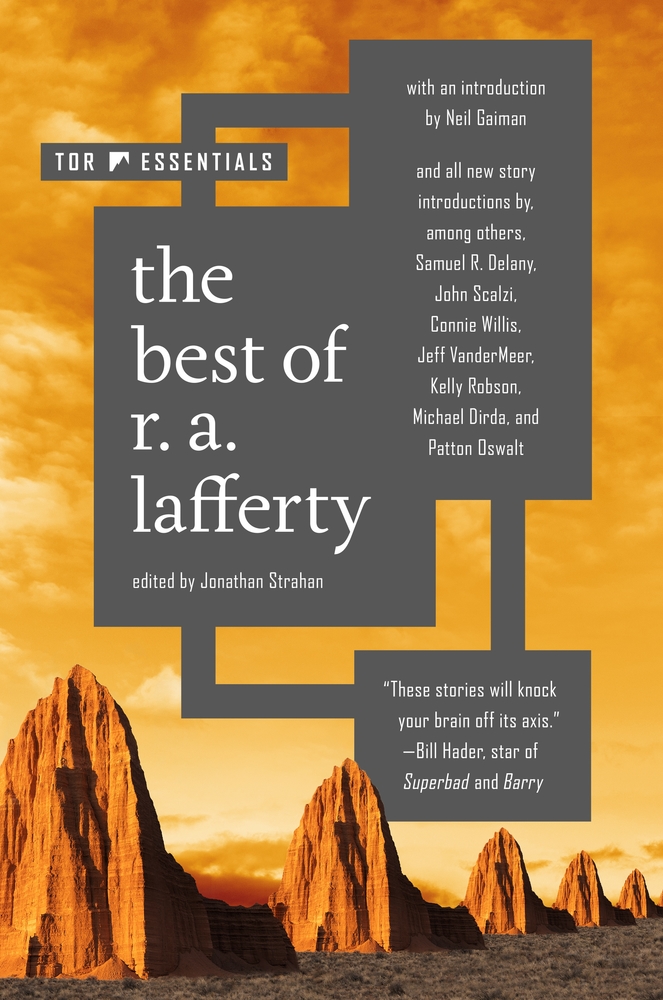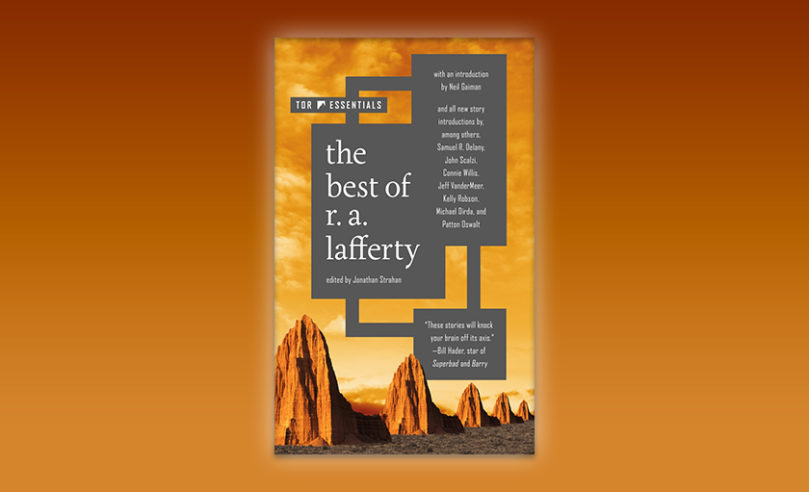 Tor Essentials presents science fiction and fantasy titles of proven merit and lasting value, each volume introduced by an appropriate literary figure.
Tor Essentials presents science fiction and fantasy titles of proven merit and lasting value, each volume introduced by an appropriate literary figure.
Acclaimed as one of the most original voices in modern literature, a winner of the World Fantasy Award for lifetime achievement, Raphael Aloysius Lafferty (1914-2002) was an American original, a teller of acute, indescribably loopy tall tales whose work has been compared to that of Avram Davidson, Flannery O’Connor, Flann O’Brien, and Gene Wolfe.
The Best of R. A. Lafferty presents 22 of his best flights of offbeat imagination, ranging from classics like “Nine-Hundred Grandmothers” (basis for the later novel) and “The Primary Education of the Cameroi,” to his Hugo Award-winning “Eurema’s Dam.”
Introduced by Neil Gaiman, the volume also contains story introductions and afterwords by, among many others, Michael Dirda, Samuel R. Delany, John Scalzi, Connie Willis, Jeff VanderMeer, Kelly Robson, Harlan Ellison, Michael Swanwick, Robert Silverberg, Neil Gaiman, and Patton Oswalt.
Please enjoy this free excerpt of The Best of R. A. Lafferty, on sale 02/02/2021.
Nine Hundred Grandmothers
Ceran Swicegood was a promising young Special Aspects Man. But, like all Special Aspects, he had one irritating habit. He was forever asking the question: How Did it All Begin?
They all had tough names except Ceran. Manbreaker Crag, Heave Huckle, Blast Berg, George Blood, Move Manion (when Move says “Move,” you move), Trouble Trent. They were supposed to be tough, and they had taken tough names at the naming. Only Ceran kept his own—to the disgust of his commander, Manbreaker.
“Nobody can be a hero with a name like Ceran Swicegood!” Manbreaker would thunder. “Why don’t you take Storm Shannon? That’s good. Or Gutboy Barrelhouse or Slash Slagle or Nevel Knife? You barely glanced at the suggested list.”
“I’ll keep my own,” Ceran always said, and that is where he made his mistake. A new name will sometimes bring out a new personality. It had done so for George Blood. Though the hair on George’s chest was a graft job, yet that and his new name had turned him from a boy into a man. Had Ceran assumed the heroic name of Gutboy Barrelhouse he might have been capable of rousing endeavors and man-sized angers rather than his tittering indecisions and flouncy furies.
They were down on the big asteroid Proavitus—a sphere that almost tinkled with the potential profit that might be shaken out of it. And the tough men of the Expedition knew their business. They signed big contracts on the native velvetlike bark scrolls and on their own parallel tapes. They impressed, inveigled, and somewhat cowed the slight people of Proavitus. Here was a solid two-way market, enough to make them slaver. And there was a whole world of oddities that could lend themselves to the luxury trade.
“Everybody’s hit it big but you,” Manbreaker crackled in kindly thunder to Ceran after three days there. “But even Special Aspects is supposed to pay its way. Our charter compels us to carry one of your sort to give a cultural twist to the thing, but it needn’t be restricted to that. What we go out for every time, Ceran, is to cut a big fat hog in the rump—we make no secret of that. But if the hog’s tail can be shown to have a cultural twist to it, that will solve a requirement. And if that twist in the tail can turn us a profit, then we become mighty happy about the whole thing. Have you been able to find out anything about the living dolls, for instance? They might have both a cultural aspect and a market value.”
“The living dolls seem a part of something much deeper,” Ceran said. “There’s a whole complex of things to be un-raveled. The key may be the statement of the Proavitoi that they do not die.”
“I think they die pretty young, Ceran. All those out and about are young, and those I have met who do not leave their houses are only middling old.”
“Then where are their cemeteries?”
“Likely they cremate the old folks when they die.”
“Where are the crematories?”
“They might just toss the ashes out or vaporize the entire remains. Probably they have no reverence for ancestors.”
“Other evidence shows their entire culture to be based on an exaggerated reverence for ancestors.”
“You find out, Ceran. You’re Special Aspects Man.”
Ceran talked to Nokoma, his Proavitoi counterpart as translator. Both were expert, and they could meet each halfway in talk. Nokoma was likely feminine. There was a certain softness about both the sexes of the Proavitoi, but the men of the Expedition believed that they had them straight now.
“Do you mind if I ask some straight questions?” Ceran greeted her today.
“Sure is not. How else I learn the talk well but by talking?”
“Some of the Proavitoi say that they do not die, Nokoma. Is this true?”
“How is not be true? If they die, they not be here to say they do not die. Oh, I joke, I joke. No, we do not die. It is a foolish alien custom which we see no reason to imitate. On Proavitus, only the low creatures die.”
“None of you does?”
“Why, no. Why should one want to be an exception in this?”
“But what do you do when you get very old?”
“We do less and less then. We come to a deficiency of energy. Is it not the same with you?”
“Of course. But where do you go when you become exceedingly old?”
“Nowhere. We stay at home then. Travel is for the young and those of the active years.”
“Let’s try it from the other end,” Ceran said. “Where are your father and mother, Nokoma?”
“Out and about. They aren’t really old.”
“And your grandfathers and grandmothers?”
“A few of them still get out. The older ones stay home.”
“Let’s try it this way. How many grandmothers do you have, Nokoma?”
“I think I have nine hundred grandmothers in my house. Oh, I know that isn’t many, but we are the young branch of a family. Some of our clan have very great numbers of ancestors in their houses.”
“And all these ancestors are alive?”
“What else? Who would keep things not alive? How would such be ancestors?”
Ceran began to hop around in his excitement.
“Could I see them?” he twittered.
“It might not be wise for you to see the older of them,” Nokoma cautioned. “It could be an unsettling thing for strangers, and we guard it. A few tens of them you can see, of course.”
Then it came to Ceran that he might be onto what he had looked for all his life. He went into a panic of expectation.
“Nokoma, it would be finding the key!” he fluted. “If none of you has ever died, then your entire race would still be alive!”
“Sure. Is like you count fruit. You take none away, you still have them all.”
“But if the first of them are still alive, then they might know their origin! They would know how it began! Do they? Do you?”
“Oh, not I. I am too young for the Ritual.”
“But who knows? Doesn’t someone know?”
“Oh, yes, all the old ones know how it began.”
“How old? How many generations back from you till they know?”
“Ten, no more. When I have ten generations of children, then I will also go to the Ritual.”
“The Ritual. What is it?”
“Once a year, the old people go to the very old people. They wake them up and ask them how it all began. The very old people tell them the beginning. It is a high time. Oh, how they hottle and laugh! Then the very old people go back to sleep for another year. So it is passed down to the generations. That is the Ritual.”
The Proavitoi were not humanoid. Still less were they “monkey-faces,” though that name was now set in the explorers’ lingo. They were upright and robed, and swathed, and were assumed to be two-legged under their garments. Though, as Manbreaker said, “They might go on wheels, for all we know.”
They had remarkable flowing hands that might be called everywhere-digited. They could handle tools, or employ their hands as if they were the most intricate tools.
George Blood was of the opinion that the Proavitoi were always masked, and that the men of the Expedition had never seen their faces. He said that those apparent faces were ritual masks, and that no part of the Proavitoi had ever been seen by the men except for those remarkable hands, which perhaps were their real faces.
The men reacted with cruel hilarity when Ceran tried to explain to them just what a great discovery he was verging on.
“Little Ceran is still on the how-did-it-begin jag,” Manbreaker jeered. “Ceran, will you never give off asking which came first, the chicken or the egg?”
“I will have that answer very soon,” Ceran sang. “I have the unique opportunity. When I find how the Proavitoi began, I may have the clue to how everything began. All of the Proavitoi are still alive, the very first generation of them.”
“It passes belief that you can be so simpleminded,” Manbreaker moaned. “They say that one has finally mellowed when he can suffer fools gracefully. By God, I hope I never come to that.”
But two days later, it was Manbreaker who sought out Ceran Swicegood on nearly the same subject. Manbreaker had been doing a little thinking and discovering of his own.
“You are Special Aspects Man, Ceran,” he said, “and you have been running off after the wrong aspect.”
“What is that?”
“It don’t make a damn how it began. What is important is that it may not have to end.”
“It is the beginning that I intend to discover,” said Ceran.
“You fool, can’t you understand anything? What do the Proavitoi possess so uniquely that we don’t know whether they have it by science or by fool luck?”
“Ah, their chemistry, I suppose.”
“Sure. Organic chemistry has come of age here. The Proavitoi have every kind of nexus and inhibitor and stimulant. They can grow and shrink and telescope and prolong what they will. These creatures seem stupid to me; it is as if they had these things by instinct. But they have them, that is what is important. With these things, we can become the patent medicine kings of the universes, for the Proavitoi do not travel or make many outside contacts. These things can do anything or undo anything. I suspect that the Proavitoi can shrink cells, and I suspect that they can do something else.”
“No, they couldn’t shrink cells. It is you who talk nonsense now, Manbreaker.”
“Never mind. Their things already make nonsense of conventional chemistry. With the pharmacopoeia that one could pick up here, a man need never die. That’s the stick horse you’ve been riding, isn’t it? But you’ve been riding it backward with your head to the tail. The Proavitoi say that they never die.”
“They seem pretty sure that they don’t. If they did, they would be the first to know it, as Nokoma says.”
“What? Have these creatures humor?”
“Some.”
“But, Ceran, you don’t understand how big this is.”
“I’m the only one who understands it so far. It means that if the Proavitoi have always been immortal, as they maintain, then the oldest of them are still alive. From them I may be able to learn how their species—and perhaps every species—began.”
Manbreaker went into his dying buffalo act then. He tore his hair and nearly pulled out his ears by the roots. He stomped and pawed and went off bull-bellowing: “It don’t make a damn how it began, you fool! It might not have to end!” so loud that the hills echoed back:
“It don’t make a damn—you fool.”
Ceran Swicegood went to the house of Nokoma, but not with her on her invitation. He went without her when he knew that she was away from home. It was a sneaky thing to do, but the men of the Expedition were trained in sneakery.
He would find out better without a mentor about the nine hundred grandmothers, about the rumored living dolls. He would find out what the old people did do if they didn’t die, and find if they knew how they were first born. For his intrusion, he counted on the innate politeness of the Proavitoi.
The house of Nokoma, of all the people, was in the cluster on top of the large flat hill, the Acropolis of Proavitus. They were earthen houses, though finely done, and they had the appearance of growing out of and being a part of the hill itself.
Ceran went up the winding, ascending flagstone paths, and entered the house which Nokoma had once pointed out to him. He entered furtively, and encountered one of the nine hundred grandmothers—one with whom nobody need be furtive.
The grandmother was seated and small and smiling at him. They talked without real difficulty, though it was not as easy as with Nokoma, who could meet Ceran halfway in his own language. At her call, there came a grandfather who likewise smiled at Ceran. These two ancients were somewhat smaller than the Proavitoi of active years. They were kind and serene. There was an atmosphere about the scene that barely missed being an odor—not unpleasant, sleepy, reminiscent of something, almost sad.
“Are there those here older than you?” Ceran asked earnestly.
“So many, so many! Who could know how many?” said the grandmother. She called in other grandmothers and grandfathers older and smaller than herself, these no more than half the size of the active Proavitoi—small, sleepy, smiling
Ceran knew now that the Proavitoi were not masked. The older they were, the more character and interest there was in their faces. It was only of the immature active Proavitoi that there could have been a doubt. No masks could show such calm and smiling old age as this. The queer textured stuff was their real faces.
So old and friendly, so weak and sleepy, there must have been a dozen generations of them there back to the oldest and smallest.
“How old are the oldest?” Ceran asked the first grandmother.
“We say that all are the same age since all are perpetual,” the grandmother told him. “It is not true that all are the same age, but it is indelicate to ask how old.”
“You do not know what a lobster is,” Ceran said to them, trembling, “but it is a creature that will boil happily, if the water on him is heated slowly. He takes no alarm, for he does not know at what point the heat is dangerous. It is that gradual here with me. I slide from one degree to another with you and my credulity is not alarmed. I am in danger of believing anything about you if it comes in small doses, and it will. I believe that you are here and as you are for no other reason than that I see and touch you. Well, I’ll be boiled for a lobster, then, before I turn back from it. Are there those here even older than the ones present?”
The first grandmother motioned Ceran to follow her. They went down a ramp through the floor into the older part of the house, which must have been under ground.
Living dolls! They were here in rows on the shelves, and sitting in small chairs in their niches. Doll-sized indeed, and several hundred of them.
Many had wakened at the intrusion. Others came awake when spoken to or touched. They were incredibly ancient, but they were cognizant in their glances and recognition. They smiled and stretched sleepily, not as humans would, but as very old puppies might. Ceran spoke to them, and they understood each other surprisingly.
Lobster, lobster, said Ceran to himself, the water has passed the danger point! And it hardly feels different. If you believe your senses in this, then you will be boiled alive in your credulity.
He knew now that the living dolls were real and that they were the living ancestors of the Proavitoi.
Many of the little creatures began to fall asleep again. Their waking moments were short, but their sleeps seemed to be likewise. Several of the living mummies woke a second time while Ceran was still in the room, woke refreshed from very short sleeps and were anxious to talk again.
“You are incredible!” Ceran cried out, and all the small and smaller and still smaller creatures smiled and laughed their assent. Of course they were. All good creatures everywhere are incredible, and were there ever so many assembled in one place? But Ceran was greedy. A roomful of miracles wasn’t enough.
“I have to take this back as far as it will go!” he cried avidly. “Where are the even older ones?”
“There are older ones and yet older and again older,” said the first grandmother, “and thrice-over older ones, but perhaps it would be wise not to seek to be too wise. You have seen enough. The old people are sleepy. Let us go up again.”
Go up again, out of this? Ceran would not. He saw passages and descending ramps, down into the heart of the great hill itself. There were whole worlds of rooms about him and under his feet. Ceran went on and down, and who was to stop him? Not dolls and creatures much smaller than dolls.
Manbreaker had once called himself an old pirate who revelled in the stream of his riches. But Ceran was the Young Alchemist who was about to find the Stone itself.
He walked down the ramps through centuries and millennia. The atmosphere he had noticed on the upper levels was a clear odor now—sleepy, half remembered, smiling, sad, and quite strong. That is the way Time smells.
Copyright © R. A. Lafferty 2021
Pre-order The Best of R. A. Lafferty Here:











